七年级英语下册 Unit 6 Outdoor fun知识点精讲(下)(新版)牛津版
- 格式:doc
- 大小:139.00 KB
- 文档页数:10
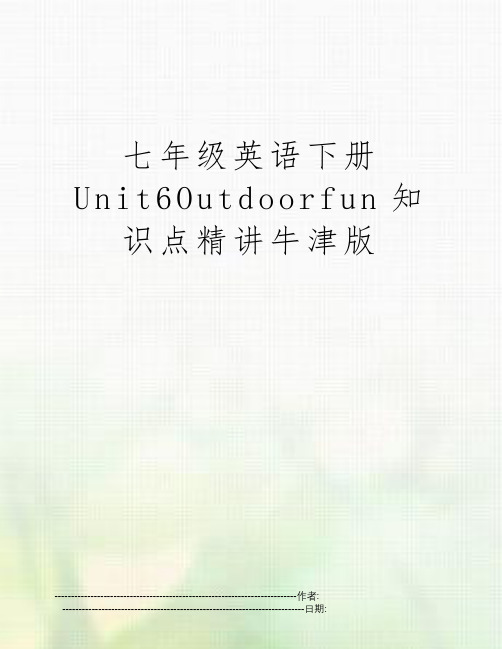
七年级英语下册U n i t6O u t d o o r f u n知识点精讲牛津版--------------------------------------------------------------------------作者: _____________--------------------------------------------------------------------------日期: _____________Unit 6 同步知识梳理(下)知识导入搭建,张贴,挂起,举起_______________ 穿过,通过_______________________ 由...制成______________________ 从那时起_________________________ 经过___________________________ 一点,少许________________________ 经过___________________________ 因...而变得出名_____________________ 看到某人正在做某事________________________________尽力做某事___________________________想要做某事___________________________练习做某事___________________________决定做某事___________________________让某人做某事_________________________记得去做某事_________________________做某事是...___________________________做某事失败了_________________________知识点梳理一.词汇&短语:WORDS&PHRASES1. He practised playing volleyball with his friends.Practice doing sth.意为“练习做某事”。
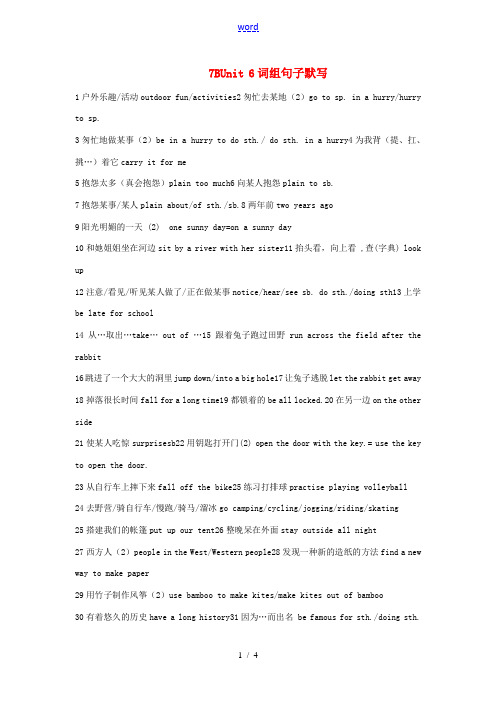
word7BUnit6词组句子默写1户外乐趣/活动outdoor fun/activities2匆忙去某地(2)go to sp. in a hurry/hurry to sp.3匆忙地做某事(2)be in a hurry to do sth./ do sth. in a hurry4为我背(提、扛、挑…)着它carry it for me5抱怨太多(真会抱怨)plain too much6向某人抱怨plain to sb.7抱怨某事/某人plain about/of sth./sb.8两年前two years ago9阳光明媚的一天 (2) one sunny day=on a sunny day10和她姐姐坐在河边sit by a river with her sister11抬头看,向上看 ,查(字典) look up12注意/看见/听见某人做了/正在做某事notice/hear/see sb. do sth./doing sth13上学be late for school14从…取出…take… out of …15跟着兔子跑过田野 run across the field after the rabbit16跳进了一个大大的洞里jump down/into a big hole17让兔子逃脱let the rabbit get away 18掉落很长时间fall for a long time19都锁着的be all locked.20在另一边on the other side21使某人吃惊surprisesb22用钥匙打开门(2) open the door with the key.= use the key to open the door.23从自行车上摔下来fall off the bike25练习打排球practise playing volleyball24去野营/骑自行车/慢跑/骑马/溜冰go camping/cycling/jogging/riding/skating25搭建我们的帐篷put up our tent26整晚呆在外面stay outside all night27西方人(2)people in the West/Western people28发现一种新的造纸的方法find a new way to make paper29用竹子制作风筝(2)use bamboo to make kites/make kites out of bamboo30有着悠久的历史have a long history31因为…而出名 be famous for sth./doing sth.32在历史上in history33在13世纪in the 13th century34一个叫…的人an Italian man called35从那时起from then on.36去野餐2have a piic/go on a piic37在湖里游泳很危险。
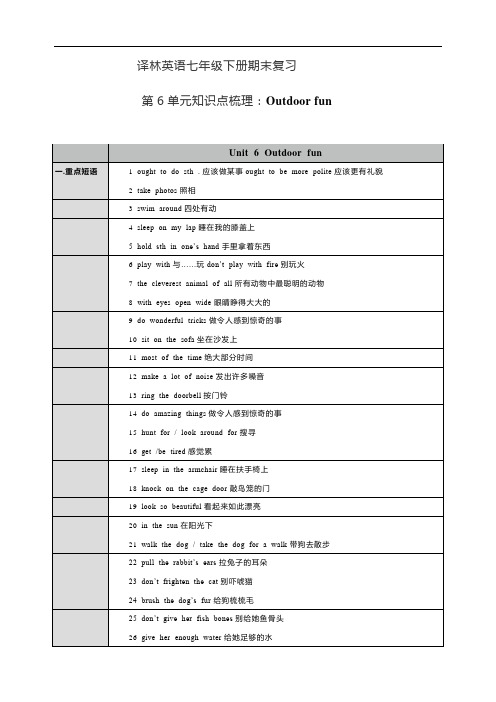
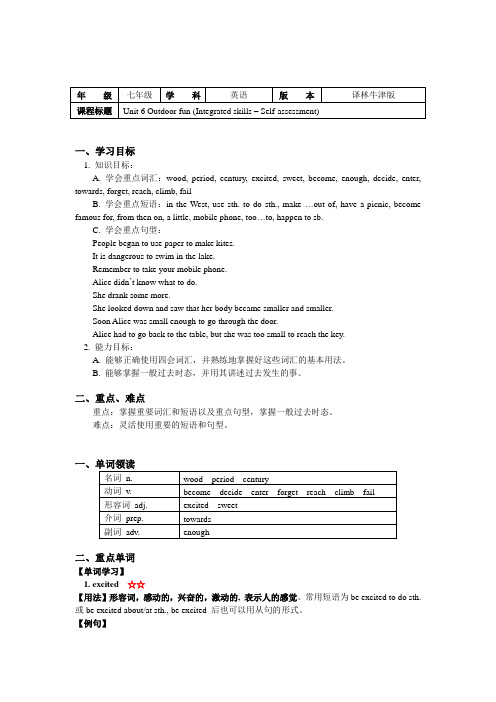
一、学习目标1. 知识目标:A. 学会重点词汇:wood, period, century, excited, sweet, become, enough, decide, enter, towards, forget, reach, climb, failB. 学会重点短语:in the West, use sth. to do sth., make …out of, have a picnic, become famous for, from then on, a little, mobile phone, too…to, happen to sb.C. 学会重点句型:People began to use paper to make kites.It is dangerous to swim in the lake.Remember to take your mobile phone.Alice didn’t know what to do.She drank some more.She looked down and saw that her body became smaller and smaller.Soon Alice was small enough to go through the door.Alice had to go back to the table, but she was too small to reach the key.2. 能力目标:A. 能够正确使用四会词汇,并熟练地掌握好这些词汇的基本用法。
B. 能够掌握一般过去时态,并用其讲述过去发生的事。
二、重点、难点重点:掌握重要词汇和短语以及重点句型,掌握一般过去时态。
难点:灵活使用重要的短语和句型。
二、重点单词【单词学习】1. excited ☆☆【用法】形容词,感动的,兴奋的,激动的, 表示人的感觉。
常用短语为be excited to do sth.或be excited about/at sth., be excited 后也可以用从句的形式。
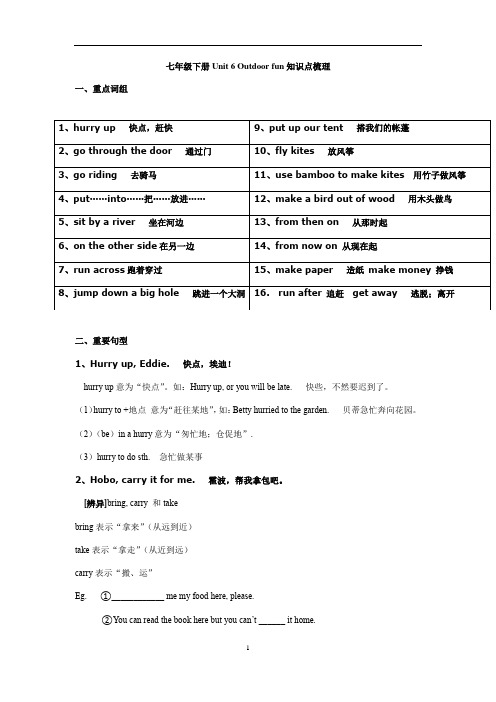
七年级下册Unit 6 Outdoor fun知识点梳理一、重点词组二、重要句型1、Hurry up, Eddie. 快点,埃迪!hurry up意为“快点”。
如:Hurry up, or you will be late. 快些,不然要迟到了。
(1)hurry to +地点意为“赶往某地”,如:Betty hurried to the garden. 贝蒂急忙奔向花园。
(2)(be)in a hurry意为“匆忙地;仓促地”.(3)hurry to do sth. 急忙做某事2、Hobo, carry it for me. 霍波,帮我拿包吧。
[辨异]bring, carry 和takebring表示“拿来”(从远到近)take表示“拿走”(从近到远)carry表示“搬、运”Eg. ①____________ me my food here, please.②You can read the book here but you can’t ______ it home.③Trains _______ more things than trucks.3、You complain too much. 你抱怨太多了。
complain to sb. about sth.向某人抱怨某事Eg. He complained______the teachers.He complained_______ his child’s bad grades.too much “太多”修饰不可数名词或修饰动词表程度too many “太多” 修饰名词复数much too “太” 修饰形容词或副词Eg. ①You shouldn’t eat _______ meat.②I’m afraid you eat _________.③Jim put _________ books into his schoolbag, so it is ______ heavy now.4、It took a watch out of its pocket and looked at the time.它从口袋里拿出一块表看了看时间。
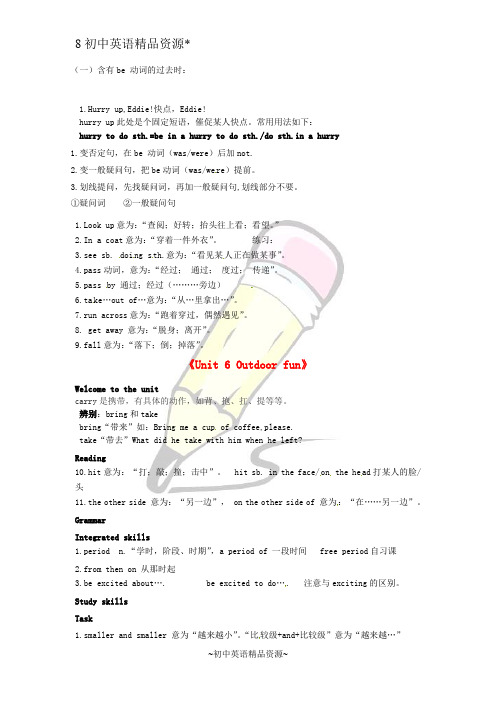
(一)含有be 动词的过去时:1.Hurry up,Eddie!快点,Eddie!hurry up此处是个固定短语,催促某人快点。
常用用法如下:hurry to do sth.=be in a hurry to do sth./do sth.in a hurry1.变否定句,在be 动词(was/were)后加not.2.变一般疑问句,把be动词(was/we re)提前。
3.划线提问,先找疑问词,再加一般疑问句,划线部分不要。
①疑问词②一般疑问句1.Look up意为:“查阅;好转;抬头往上看;看望。
”2.In a coat意为:“穿着一件外衣”。
练习:3.see sb. doi ng s th.意为:“看见某人正在做某事”。
4.pass动词,意为:“经过;通过;度过;传递”。
5.pass by 通过;经过(………旁边)6.ta ke…out of…意为:“从…里拿出…”。
7.run across意为:“跑着穿过,偶然遇见”。
8. get away 意为:“脱身;离开”。
9.fall意为:“落下;倒;掉落”。
《Unit 6 Outdoor fun》Welcome to the unitcarry是携带,有具体的动作,如背、抱、扛、提等等。
辨别:bring和takebring“带来”如:Bring me a cup of coffee,please.take“带去”What did he take with him when he left?Reading10.hit意为:“打;敲;撞;击中”。
hit sb. in the face/on the he ad打某人的脸/头11.the other side 意为:“另一边”, on the other side of 意为:“在……另一边”。
GrammarIntegrated skills1.period n.“学时,阶段、时期”,a period of 一段时间 free period自习课2.from then on 从那时起3.be excited about…. be excited to do…. 注意与exciting的区别。
Unit6 Outdoor fun 第一节:单词背默1.outdoor adj. 户外的2.hurry vi. 急忙,匆忙plain vi. &vt. 抱怨4.that adv. 那么,那样5.camping n. 野营6.cycling n. 骑自行车运动7.riding n. (=horse riding)骑马8.skating n. 溜冰9.ride vt. 骑(马、自行车等)10.outside adv. 在外面11.rabbit n. 兔,家兔12.hole n. 洞13.by prep. 在……旁边,靠近adv. 经过14.pass vi.& vt. 经过;通过15.dear excl. 哎呀,天哪,啊16.watch n. 手表17.fall vi 落下,掉落;倒18.hit vt. 到达;击中,撞19.herself pron. 她自己20.alone adj.&adv. 独自,单独21.low adj. 低的,矮的22.locked adj. 锁上的23.notice vt. 注意,察觉24.into prep. 到……里面25.side n. 侧,边26.through prep. 穿过通过27.surprise vt. 使惊奇,使措手不及28.tent n. 帐篷29.wood n.木头,木材30.period n. 一段时间,时期31.dynasty n. 朝代, 王朝32.century n. 世纪,百年33.Italian adj. 意大利的34.become v. 开始变得,变成35.province n. 省36.excited adj. 激动的37.sweet adj. 甜的38.enough a dv. 足够地,充分地39.decide vt. &vi. 决定40.enter vt. 进入41.towards prep. (=toward)向,朝42.forget vi. &vt. 忘记43.reach vt. 伸手(脚)够到44.climb vi. &vt. 爬,攀登45.fail vi. &vt. 失败随堂练习一、根据首字母或汉语提示写出单词。
Unit 6 Outdoor fun单元知识点总结◆hurry up 赶快,快点◆carry it for me 替我把它拿一下◆complain too much 抱怨的太多◆go+doinggo riding去骑马go camping去宿营go swimming 去游泳go skating去滑冰 go cycling去骑自行车 go jogging去慢跑锻炼◆like being outside 喜欢待在外面◆one sunny day 在一个晴朗的日子◆sit by a river 坐在河边◆look up 抬头看◆pass by 经过,路过◆hear sb do sth 听到某人做了某事或经常听到某人做某事I often hear her sing in the next room. 我常常听到她在隔壁房间里唱歌。
◆注意此处的often限定sing◆hear sb doing sth 听到某人正在做某事或强调听到做某事过程中的一个片段She heard someone singing in the next room at seven last night.昨天晚上七点钟的时候她听到有人在隔壁房间里唱歌。
◆注意此处的at seven last night限定了该句必须使用singing类似的结构有:◆see/watch/notice/ sb do sth看见/观看/注意某人做了某事或经常做某事◆see/watch/notice sb doing sth看见/观看/注意某人正在做某事或做某事过程中的一个片段Can you see the students playing football in the playground?你能看见学生们在操场上踢足球吗I like watching goldfish swim around in the tank. (鱼缸)我喜欢观看金鱼在鱼缸里游来游去。
牛津七年级下册期末知识点归纳Unit 6 Outdoor fun第一部词汇1.匆忙___________ 三单式___________ 过去式___________2.抱怨___________3.野营___________4.骑车运动___________ 骑自行车______________________5.骑马6.溜冰___________7.在外面___________8.兔子___________9.洞___________10.经过___________ 过去式___________11.走过一个邮局______________________12.12个手表______________________ 第20个手表______________________13.落下___________ 过去式___________14.感觉___________ 过去式___________15.到达,击中___________ 过去式___________16.独自,单独___________17.锁上的___________18.注意,察觉___________19.侧,边___________20.穿过,通过___________ 从窗户穿过______________________21.使惊奇,使措手不及___________22.一段时间___________23.木头___________24.世纪,百年___________25.激动的___________ 令人激动的___________26.甜的___________27.开始变得___________ 过去式___________28.足够___________29.决定___________ 决定做______________________30.进入___________31.向、朝___________32.忘记___________ 过去式___________33.伸手够到;到达某处___________34.攀登___________35.失败___________ 过去式___________ 做某事失败______________________【单词强化训练:】1.Every year, thousands of foreign___________(visit) come to Beijing.2.It is very dangerous to play with ___________ (match).3.What about ___________ (go) fishing with me tomorrow!4.Tom doesn’t look ___________ (health) today.5.---Who ___________ (plant) the apple tree on the farm? --- Uncle Li did.6.---What will the weather be like tomorrow?---I think it will be ___________ (晴朗).7.Did you see Tom ___________(经过) by just now?8.Tom ___________(注意)a small door and put the key into it.9.He couldn’t get into the room because all the door are ___________(lock)。
Unit 6 同步知识梳理(下)知识导入搭建,张贴,挂起,举起_______________ 穿过,通过_______________________ 由...制成______________________ 从那时起_________________________ 经过___________________________ 一点,少许________________________ 经过___________________________ 因...而变得出名_____________________ 看到某人正在做某事________________________________尽力做某事___________________________想要做某事___________________________练习做某事___________________________决定做某事___________________________让某人做某事_________________________记得去做某事_________________________做某事是...___________________________做某事失败了_________________________知识点梳理一.词汇&短语:WORDS&PHRASES1. He practised playing volleyball with his friends.Practice doing sth.意为“练习做某事”。
我们应该每天都练习说英语。
We should practice speaking English every day.我妈妈叫我每天练习眼钢琴My mother asks me to practice playing the piano every day.2.She did some shopping with her mum yesterday afternoon.Do dome shopping意为“买东西、购物”。
我妈妈经常在周末购物。
My mother often does shopping at the weekend,让我们一起去买东西吧。
Let’s do some shopping together.【拓展】“do+some+v.-ing”结构常表示一些笼统而不明指的事。
Do some reading 阅读 do some cleaning 打扫卫生do some cooking 烹饪 do some washing 洗衣服3.We put up our tent near a lake.(1).put up此处意为“建造,搭起”。
另外,put up还可意为“挂起;张贴;举起;抬起”。
他们正在建造几幢新楼。
They’re putting up several new buildings.请帮我挂起这幅画。
Please help me put up the picture.【拓展】与put相关的短语Put on穿上 put off推迟 put away扑灭 put down放下(2).tent可数名词,意为“帐篷”。
你家中有两顶帐篷吗?Do you have two tents at home?4.told people in the West all about kites.People in the West西方人(民)。
West名词,意为“西方”,其形容词形式为Western。
Western food西餐 Western countries西方国家【拓展】east(东方)——eastern(东方的) south(南方)——southern(南方的)north(北方)——northern5.made a bird out of wood(1).make...out of意为“用...制成...”,相当于use...to make...。
我能用布做成一朵花。
I can make a flower out of cloth.=I can use cloth to make a flower. ____________________________________________(2)Wood 不可数名词,意为“木头,木材”。
干燥的木头容易起火。
It is easy for dry wood to catch fire.【拓展】woods意为“森林,树林”。
咱们去树林里散步吧。
Let’s take a walk in the woods.6.In the13th century...Century可数名词,意为“世纪,百年”。
固定结构“the+序数词+century”表示“第几世纪”。
在20世纪,中国发生了巨大的变化。
Great changes have taken place in China in the twentieth century.7.Weifang,a city in Shandong Province,has become famous for making kites from then on.(1).become famous for 意为“因...而变得有名”,强调动作。
这座城市因它的美丽而变得有名。
The city becomes famous for its beauty.(2).From then on 意为“从那时起”,指以过去某个时刻为起点延续下来。
从那时起,我便开始对英语感兴趣了。
From then on,I became interested in English.从那以后他再也没有见过他叔叔了。
From then on,he never saw his uncle again.【拓展】from now on意为“从现在起”,指以现在为起点延续下去,通常用于将来时中。
从现在起我将努力学习。
I am going to work hard from now on.8.It’s dangerous to swim in the lake.“It+be+形容词+to do sth”.是英语中已非常用的句式,意为“做某事是...的”。
It为形式主语,真正的主语是动词不定式。
如果表示“某人做某事怎么样”,则用“It+be+形容词+for sb.+to do sth”.弹钢琴对她来说很容易。
It’s easy for her to play the piano.保护我们的地球对我们来说是重要的。
It’s important for us to protect our earth.【注意】如果形容词说明人的品质、品德,则用介词of,而不用for.帮助那位老人你真善良。
It;s nice of you to help the old man.9.If two words start with the same letter,we look at the second letter of the world we want to look up.(1).start with意为“从...开始;以...为开端”。
晚会以一首甜美的歌曲开始。
The party started with a sweet song.千里之行始于足下。
A thousand Li journey starts with the first step.(2).we want ti look up意为“我们要查询的(单词)”,在句中为定语从句,用来修饰先行词word。
其中在先行词word后省略了关系词that。
这是我昨天买的一本书。
This is a book(that)I bought yesterday.10.Alice did not know what to do.What to do 是“疑问词+不定式”结构。
这一结构相当于一个名词性从句,可在句子中作主语、宾语、表语等。
该怎样做仍然是一个问题。
How to do it is still a question.(作主语)我不知道去哪里。
I don’t know where to go.(作宾语)问题是谁去做这件事。
The question is who to do it.11.Alice opened the bottle and drank a little.A little意为“一点少许”,通常用来修饰形容词或动词。
请你把电视音量调小一点好吗?Will you please turn town the TV a little?因为今天早上没有吃早饭就去上学,所以我现在有点饿了。
I went to school without breakfast this morning,so I am a little hungry now.【拓展】(1).a little意为“一点,少许,少量”,通常用来修饰不可数名词,相当于a bit of。
他需要少许水。
He needs a little water.=He needs a bit of water.(2).little意为“小的”,通常用来修饰可数名词单数。
表示人(或动物)事物幼小,常常有赞赏、怜悯的感情色彩。
我有一只小猫。
I have a little cat.12.She drank some more.Some more 意为“再一些,又一些”。
曹云金讲的故事很有趣,我还想再听几个。
Cao Yunjin’s stories are very interesting,so I want to listen to some more.【拓展】“数词(大于1)+more+名词复数”意为“再...,又...”,相当于“another+数词(大于1)+名词复数”。
I need three more apples.=I need another three apples.我还需要3个苹果。
13.She looked down and saw that her body became smaller and smaller.Smaller and smaller意为“越来越小”。
“比较级+and+比较级”意为“越来越...”。
如果是部分双音节或多音节的形容词或副词表达这一含义时,应用“more and more+原级”结构。
手机现在越来越大。
Mobile phones are bigger and bigger now.我们的家乡变得越来越美丽了。
Our hometown is getting more and more beautiful.14.Soon Alice was small enough to go through the door,so she decided to enter the garden. (1).enough此处用作副词,意为“足够地,充分地”。